Project management is the process of planning, organizing, and controlling resources, such as time, cost, and scope, to achieve specific goals and objectives of a project. Project management involves a set of processes that include defining project objectives and scope, identifying stakeholders, creating a project plan, estimating resources required, scheduling activities, executing the plan, monitoring progress, and controlling the project to ensure it is completed on time, within budget, and to the desired quality standards.
The project management process is typically divided into several phases: initiation, planning, execution, monitoring and controlling, and closing. During each phase, project managers and their teams will work together to identify and manage risks, resolve issues, communicate with stakeholders, and make any necessary changes to the project plan.
Effective project management requires a combination of technical skills, efficient project management tools such as robust application systems, project planning and scheduling, and soft skills, such as leadership, communication, and teamwork. Using the best project management tools, techniques, and methodologies can help project managers improve their chances of successfully delivering projects.
1. Asana: Asana is a popular project management tool used by teams of all sizes to manage their tasks and projects. The tool features a user-friendly interface that allows users to create, assign, and track tasks easily. Asana offers customizable project boards, that are highly visual and easy to use, helping teams stay organized and on track. Teams can also use Asana’s collaboration features to communicate with each other and share files, making it an excellent tool for remote teams.
2. Trello: Trello is a web-based project management tool that uses a board-and-card interface to help users organize their tasks and projects. The tool is highly visual, allowing users to see the status of their tasks at a glance. Trello features drag-and-drop functionality, making moving tasks from one board to another easy. Teams can also use Trello’s collaboration features to communicate with each other and share files.
3. Monday.com: Monday.com is a cloud-based project management tool that helps teams plan, track, and manage their projects. The tool features customizable workflows, allowing teams to tailor it to their specific needs. Monday.com offers team collaboration tools, including a chat feature, that allows team members to communicate with each other in real-time. The tool also integrates with other business applications, making it an excellent choice for teams that use multiple tools.
4. Jira: Jira is a web-based project management tool designed for software development teams. The tool features agile project management tools designed to help teams manage their software development projects efficiently. Jira offers bug tracking, allowing teams to track and resolve bugs quickly. The tool also features team collaboration tools, including a chat feature, that allows team members to communicate with each other in real time.
5. Basecamp: Basecamp is a web-based project management tool that helps teams manage their projects and communicate with each other. The tool features project tracking tools, including to-do lists, calendars, and project timelines, which help teams stay organized and on track. Basecamp also offers team collaboration features, including a chat feature that allows team members to communicate with each other in real time. The tool also includes file-sharing capabilities, making it easy for teams to share files and collaborate on documents.
The reasons why should a business choose and invest in the best project management tools:-
1. Task management: Project management tools’ ability to create, assign, and track tasks is a core feature. This includes setting due dates, assigning tasks to specific team members, and tracking the status of each task.
2. Collaboration: Project management tools often include collaboration features such as chat, comments, and file sharing. These tools allow team members to communicate with each other, share files, and work together on tasks and projects.
3. Project tracking: Project management tools typically include features that allow teams to track the progress of their projects. This can include project timelines, calendars, and dashboards that provide a visual representation of how the project is progressing.
4. Resource management: Some project management tools include features for managing resources, such as team members, equipment, and budget. This can include tools for scheduling team members, tracking expenses, and managing project budgets.
5. Reporting and analytics: Project management tools often include features for generating reports and analyzing project data. This can include reports on project progress, team performance, and budget tracking.
6. Customization: Many project management tools allow teams to customize the tool to their specific needs. This can include customizing workflows, adding integrations with other tools, and setting up custom notifications and alerts.
7. Mobile access: With many teams working remotely or on the go, mobile access has become an important feature for project management tools. Many tools now offer mobile apps that allow users to access the tool from their smartphones or tablets.
The tools available give flexibility, help create a robust system, enhance the efficiency of the team, and prevent any conflicts.










Leave a Reply